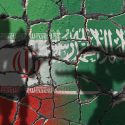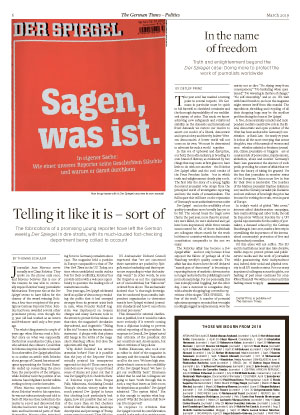Truth and enlightenment beyond the Der Spiegel case: Doing more to protect the work of journalists worldwide
The year 2018 has marked a turning point in several respects. We Germans in particular must be quick to bid farewell to cherished certainties and the thorough dependability of our multilateral system of order. This much we know: achieving new safeguards and reinforced stability on the domestic and international front demands we restore our resolve to assert our model of a liberal, democratic and open society and thereby bolster Western democracies. A better world will not come on its own. We must be determined to advocate for such a world – together.
In this era of upheaval and disruption, our field, the media industry, is breeding its own brand of distress, as evidenced by two things that may seem at first glance to have little to do with one another – the Relotius Der Spiegel affair and the 2018 results of the Press Freedom Index – but in which truth and enlightenment clearly play a role. The first tells the story of a young, highly decorated journalist who strays from the principled world of investigative reporting and into the realm of sensationalism. The full impact this will have on the reputation of Germany’s most authoritative news outlet – Der Spiegel – and on the credibility of our quality journalism more broadly has yet to be felt. The second bears the tragic news that in the past year, more than 80 journalists were killed, 60 were abducted and 348 have been imprisoned, while three remain unaccounted for. All of these individuals are colleagues whose search for the truth led them to countries without a democratic constitution comparable to the one we enjoy.
The Relotius affair has become a Der Spiegel affair – and not only because it has exposed the failure of perhaps all of the Hamburg weekly’s quality controls. The affair has also shown how the self-declared “assault gun of democracy” is becoming a reporting factory of aesthetic-driven stories no longer anchored in the publishing house’s promotional pledge. For me personally, this case is simply mind-boggling. Just the other day, I saw a customer in a magazine shop with a slender shopping bag covered in repetitions of the slogan “DER SPIEGEL – No fear of the truth.” A number of potential aphorisms sprang to my mind that we might mockingly suggest as replacements, were the matter not so dire: “No shying away from consequences,” “No hesitating when questioned,” “No wavering in the face of change,” “No self-censorship,” and so on. We wait with bated breath to see how the magazine might extract itself from this scandal. The expeditious shredding and recycling of all their shopping bags may be the smallest problem facing the boss at Der Spiegel.
A free, democratically minded and independent media’s constitutive role in the liberal, democratic and open societies of the West has been anchored in Germany’s constitution – or Basic Law – for nearly 70 years. It is thus all the more worrying that across the globe, tens of thousands of women and men – whether salaried or freelance journalists, citizen journalists or bloggers – are at constant risk of persecution, imprisonment, abduction, abuse and murder. Germany’s Basic Law guarantees the absence of such perils, providing for a state of affairs that we have the luxury of taking for granted. Yet the fact that journalists in member states of the European Union must live in fear for their lives is intolerable. The murders of the Maltese journalist Daphne Galizia in 2017 and the Slovak journalist Ján Kuciak in 2018 are evidence of how high the price has become for seeking the truth, even in parts of Europe.
In today’s world of global “fake news,” internet-aided disinformation campaigns, hate-mail mobbing and cyber trolls, the call by Reporters Without Borders for a UN special representative for the safety of journalists, a demand echoed by the German Bundestag in June 2017, marks a first step in crystallizing the importance of the international community’s protection of free and independent journalism.
Yet this alone will not suffice. The EU and its institutions must also take decisive, visible steps to protect private and public service media and the work of journalists while guaranteeing their independence and, indeed, their social and physical security in all EU member states. For our many imprisoned colleagues across the globe, our hashtag of past years continues for 2019: #FreeThemAll! We will not relent until this hashtag ceases to apply.
Detlef Prinz
is publisher of The German Times.




